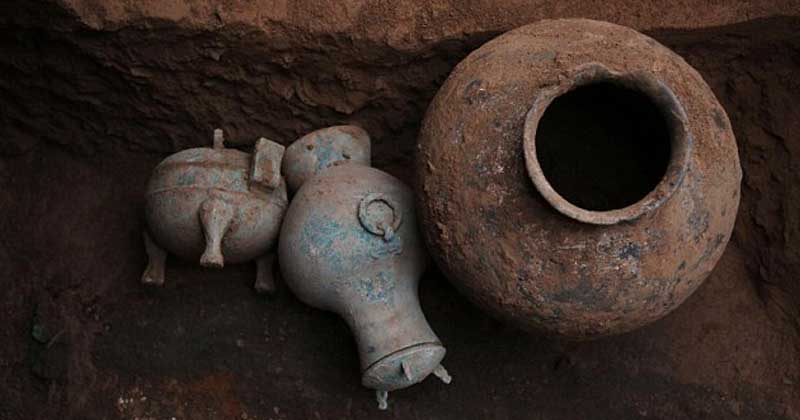There’s nothing like unwinding with a glass of wine after a hard day of work. Wine is just perfect to take your mind of work-related things and help you relax. Plus, it’s so highly ingrained in the pop culture today that one can not really escape the trend/self-care technique.
However, relaxing with a tall glass of wine is not a modern phenomenon, in fact, Europeans are considered to be the real wine connoisseur, almost since the development of wine and alcohol. But they’re not alone in this tipsy history. The recent findings by archeologists in China reveal that Chinese enjoyed the tipple just as much.
 In the ruins of Shaanxi, China, archaeologists from the Archeological Research Institute of Shaanxi Province, have found a vintage wine which is thought to be more than 2000 years old in a commoner’s tomb. The liquid, measuring 300 milliliters, proves that ordinary people in the Qin Dynasty (221-207 BC) enjoyed drinking alcohol, according to researchers, as reported by Daily Mail.
In the ruins of Shaanxi, China, archaeologists from the Archeological Research Institute of Shaanxi Province, have found a vintage wine which is thought to be more than 2000 years old in a commoner’s tomb. The liquid, measuring 300 milliliters, proves that ordinary people in the Qin Dynasty (221-207 BC) enjoyed drinking alcohol, according to researchers, as reported by Daily Mail.
 This 2000-year-old vintage wine was discovered inside a well-sealed bronze vessel which is found to date back to the Qin Dynasty, the first power-centralized dynasty in the Chinese history.
This 2000-year-old vintage wine was discovered inside a well-sealed bronze vessel which is found to date back to the Qin Dynasty, the first power-centralized dynasty in the Chinese history.
The experts from the institute that found the vessel said the alcohol, now milky yellow, was a type of fermented alcoholic beverage. And, the container in which it was kept is identified as Zhong, which appears similar to the one that was normally used during a sacrifice ceremony in ancient China.
 The discovery of this 2000-year-old vintage wine is described as ‘surprise’ by the archaeologists.
The discovery of this 2000-year-old vintage wine is described as ‘surprise’ by the archaeologists.
The alcohol survived till now because of how well the container was sealed. It was covered by a tough sackcloth which was tied around the vessel with plant vines.
From May 2017 to January 2018, researchers excavated a group of 56 ancient tombs for a new subway project in the Xixian New District in Shaanxi Province. From May 2017 to January 2018, researchers excavated a group of 56 ancient tombs for a new subway project in the Xixian New District in Shaanxi Province.
Jyotsna Amla


